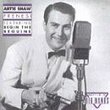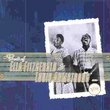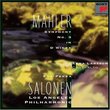| All Artists: Fryderyk Chopin Title: Chopin: Ballade No. 4, Polonaise-fantaisie, Barcarolle, Berceuse Members Wishing: 0 Total Copies: 0 Label: Decca Import Original Release Date: 1/1/2001 Re-Release Date: 11/13/2001 Album Type: Import Genre: Classical Styles: Forms & Genres, Ballads, Historical Periods, Classical (c.1770-1830) Number of Discs: 1 SwapaCD Credits: 1 UPC: 028946670828 |
Search - Fryderyk Chopin :: Chopin: Ballade No. 4, Polonaise-fantaisie, Barcarolle, Berceuse
 | Fryderyk Chopin Chopin: Ballade No. 4, Polonaise-fantaisie, Barcarolle, Berceuse Genre: Classical
This is Ashkenazy's fourth studio recording of the "Barcarolle," his third of the Ballade in F Minor, and his second of the Polonaise-fantasie, and he has found something new to say about each of them. The performance of t... more » |
Larger Image |
CD DetailsSynopsis
Amazon.com This is Ashkenazy's fourth studio recording of the "Barcarolle," his third of the Ballade in F Minor, and his second of the Polonaise-fantasie, and he has found something new to say about each of them. The performance of the Ballade does not supersede his white-hot 1964 recording (available on a Decca Legends disc). But there is a more assured narrative sweep that, without eschewing any important details, makes this new performance a marvel of musical storytelling. The "Barcarolle" is also gentler than its predecessors. Ashkenazy has lost some of his old power, but he has an expanded capacity for playing softly with a full range of nuance for extended periods. Every phrase of Ashkenazy's "Barcarolle" is filled with yearning, nobility, and passion; it's among the best performances of the piece ever recorded. That's also true of the Polonaise-fantasie. Ashkenazy no longer seems to be straining to make sense of this mysterious and episodic piece. He has been performing Chopin's music in public for almost 50 years and has recorded all of it, most of it more than once. It is Ashkenazy's familiarity with his music, perhaps, that permits him to play the greatest and most problematic of Chopin's works almost as if he were dreaming it. --Stephen Wigler Similarly Requested CDs
|
CD ReviewsAshkenazy's revision of his own Chopin Alex Serrano | Perrysburg, Ohio United States | 11/15/2001 (5 out of 5 stars) "Nearly 3 months ago i wrote a review of Daniel Barenboim's recording of Albeniz piano music - a great recital indeed, and now reviewing this new Chopin cd as played by Vladimir Ashkenazy brings me equal pleasure but a paralel must be drawn between both musicians. Both started their careers as piano virtuosos - Barenboim concentrating on the German repertoire and Ashkenazy virtually on everything he could get his hands on. Apparently at some time both these pianists musthave gotten bored with a soloist career and got into conducting with quite favorable results. Barenboim's tenure in Chicago has brought great innovation to the city, and Ashkenazy's involvement with the Cleveland, Philharmonia, Concertegebouw, and German Orchestras has always brough refined craftmanship and musical understanding. Barenboim went back to the studio with piano music of Albeniz - new to his repertoire, Ashkenazy has chosen to revisit some of his Chopin recordings - the result is breathtaking. Unlike his previous Chopin recordings, Ashkenazy takes his time and his new rendition of the Ballade No.4 unfolds in a long line of nuances which are yet logical and never overdetailed. He sets ups to tell a story and does so brilliantly. The Berceuse here is another treasure - played as if every note had its significance and not merely as ornaments. With an ending fading away as the true bed-song it portrays. Without a doubt, it is the best rendition i have ever heard of this work. The polonaise-fantasie is an odd approach - almost played as another ballade he holds the piece together bringing new voices and recalling themes all about - extremely detailed. The final chordal and octave explosions and polonaise rhythms are barely recognizable as part of the story told before. It is a very personal statement - and coming from a talent such as his it is worth hearing. A selection of nocturnes, waltzes, and mazurkas follows. Here we get vintage Ashkenazy - clarity, articulation, and some coldness. His final nocturnes simply do not fly as a Horowitz or a Lhevinne. Still, this is great playing. A passionate Barcarolle closes the program. Ashkenazy pulls the work toward the final chords and the conclusion for once seems integrated into the preceeding framework. Another example of a great pianist in total control of his art. Ashkenazy must have thought very thoroughly before recording these works again - he must have known that comparisons with his earlier renditions would be made. I am sure he must have felt that he had something new to say about these works before settling into the studio. And how right he has been in doing so. Regardless of his previous recordings, i can not imagine a better Chopin recital from any pianist today. It is obvious he had something to say about these overly played works - his message to this reviewer has come clear and welcome. Bravo!" Strong, assured pianism that's not very imaginative Santa Fe Listener | Santa Fe, NM USA | 06/12/2009 (3 out of 5 stars) "The Amazon reviewer gushes over Ashkenazy's narrative mastery in the fourth Ballade, echoed by the 5-star reviewer. What are they referring to? His new version proceeds for the most part in a straight line, with direct phrasing, minimal rubato, not much change of color, and assured phrasing that is not, however, eye-opening. The building of climaxes is done with the bravura one expects form this, one of the most enduring Russian expatriate pianists. There's power and confidence but not enough imagination.
With so little personality on display, I'd defy anyone to hear this recital blind and say, "Oh yes, that's unmistakably Ashkenazy" as one would say with Cortot, Rachmaninov, Moisewitsch, Rubinstein, Argerich, and Horowitz. At times Ashkenazy is simply impersonal, as in the Berceuse, and just as often he's generic. The great Polonaise-Fantasie gets off to a strong declamatory start, but the line soon wanders off into nothing very specific. After all these decades, does this music mean much to him? I like the rhythmic snap he gives to the three waltzes of Op. 64, but nothing is dazzling or exuberant enough. The three Mazurkas of Op. 59 are solidly grounded in their basic 2/3 time, which compares well to other pianists who cut the rhythm entirely loose and wind up maundering along. The Barcarolle that ends this program offers pianism I can't object to or get excited about, either. Which more or less sums up the entire CD. I don't consider conventionality an enormous virtue, I'm afraid." |

 Track Listings (12) - Disc #1
Track Listings (12) - Disc #1








